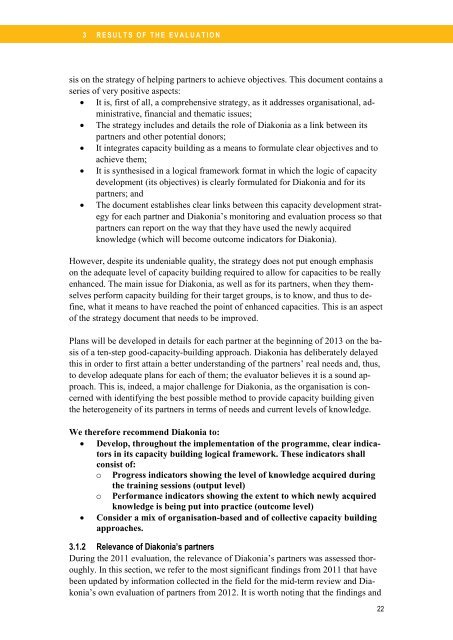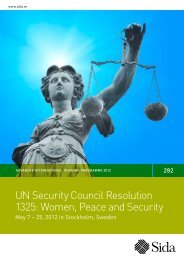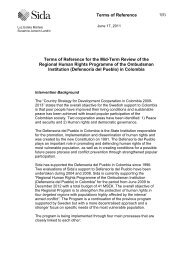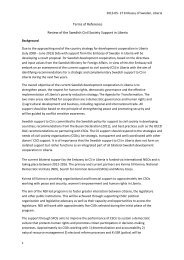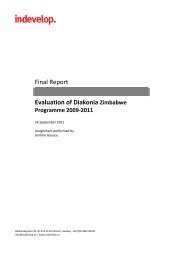Mid-term Review of the Diakonia Strategic Peace Building ... - Sida
Mid-term Review of the Diakonia Strategic Peace Building ... - Sida
Mid-term Review of the Diakonia Strategic Peace Building ... - Sida
You also want an ePaper? Increase the reach of your titles
YUMPU automatically turns print PDFs into web optimized ePapers that Google loves.
3 R E S U L T S O F T H E E V A L U A T I O N<br />
sis on <strong>the</strong> strategy <strong>of</strong> helping partners to achieve objectives. This document contains a<br />
series <strong>of</strong> very positive aspects:<br />
It is, first <strong>of</strong> all, a comprehensive strategy, as it addresses organisational, administrative,<br />
financial and <strong>the</strong>matic issues;<br />
The strategy includes and details <strong>the</strong> role <strong>of</strong> <strong>Diakonia</strong> as a link between its<br />
partners and o<strong>the</strong>r potential donors;<br />
It integrates capacity building as a means to formulate clear objectives and to<br />
achieve <strong>the</strong>m;<br />
It is syn<strong>the</strong>sised in a logical framework format in which <strong>the</strong> logic <strong>of</strong> capacity<br />
development (its objectives) is clearly formulated for <strong>Diakonia</strong> and for its<br />
partners; and<br />
The document establishes clear links between this capacity development strategy<br />
for each partner and <strong>Diakonia</strong>’s monitoring and evaluation process so that<br />
partners can report on <strong>the</strong> way that <strong>the</strong>y have used <strong>the</strong> newly acquired<br />
knowledge (which will become outcome indicators for <strong>Diakonia</strong>).<br />
However, despite its undeniable quality, <strong>the</strong> strategy does not put enough emphasis<br />
on <strong>the</strong> adequate level <strong>of</strong> capacity building required to allow for capacities to be really<br />
enhanced. The main issue for <strong>Diakonia</strong>, as well as for its partners, when <strong>the</strong>y <strong>the</strong>mselves<br />
perform capacity building for <strong>the</strong>ir target groups, is to know, and thus to define,<br />
what it means to have reached <strong>the</strong> point <strong>of</strong> enhanced capacities. This is an aspect<br />
<strong>of</strong> <strong>the</strong> strategy document that needs to be improved.<br />
Plans will be developed in details for each partner at <strong>the</strong> beginning <strong>of</strong> 2013 on <strong>the</strong> basis<br />
<strong>of</strong> a ten-step good-capacity-building approach. <strong>Diakonia</strong> has deliberately delayed<br />
this in order to first attain a better understanding <strong>of</strong> <strong>the</strong> partners’ real needs and, thus,<br />
to develop adequate plans for each <strong>of</strong> <strong>the</strong>m; <strong>the</strong> evaluator believes it is a sound approach.<br />
This is, indeed, a major challenge for <strong>Diakonia</strong>, as <strong>the</strong> organisation is concerned<br />
with identifying <strong>the</strong> best possible method to provide capacity building given<br />
<strong>the</strong> heterogeneity <strong>of</strong> its partners in <strong>term</strong>s <strong>of</strong> needs and current levels <strong>of</strong> knowledge.<br />
We <strong>the</strong>refore recommend <strong>Diakonia</strong> to:<br />
Develop, throughout <strong>the</strong> implementation <strong>of</strong> <strong>the</strong> programme, clear indicators<br />
in its capacity building logical framework. These indicators shall<br />
consist <strong>of</strong>:<br />
o Progress indicators showing <strong>the</strong> level <strong>of</strong> knowledge acquired during<br />
<strong>the</strong> training sessions (output level)<br />
o Performance indicators showing <strong>the</strong> extent to which newly acquired<br />
knowledge is being put into practice (outcome level)<br />
Consider a mix <strong>of</strong> organisation-based and <strong>of</strong> collective capacity building<br />
approaches.<br />
3.1.2 Relevance <strong>of</strong> <strong>Diakonia</strong>’s partners<br />
During <strong>the</strong> 2011 evaluation, <strong>the</strong> relevance <strong>of</strong> <strong>Diakonia</strong>’s partners was assessed thoroughly.<br />
In this section, we refer to <strong>the</strong> most significant findings from 2011 that have<br />
been updated by information collected in <strong>the</strong> field for <strong>the</strong> mid-<strong>term</strong> review and <strong>Diakonia</strong>’s<br />
own evaluation <strong>of</strong> partners from 2012. It is worth noting that <strong>the</strong> findings and<br />
22


